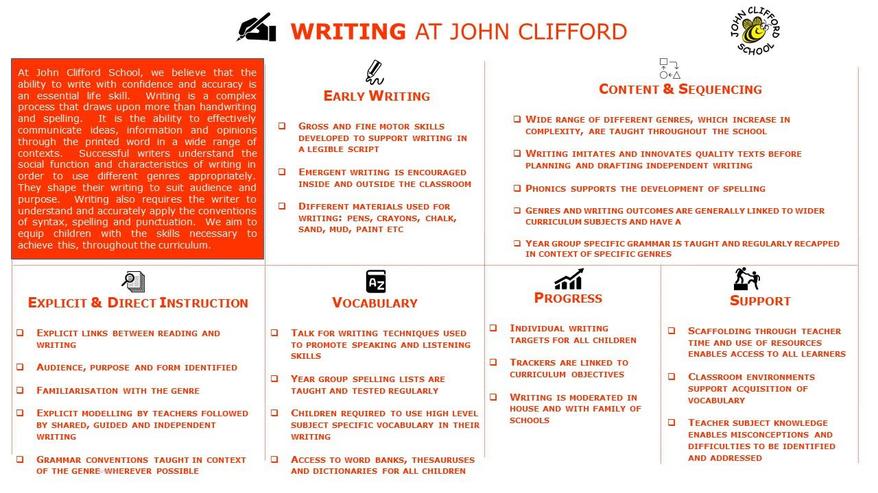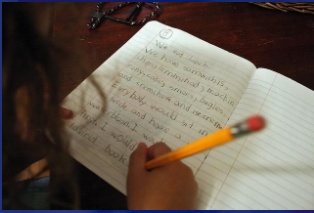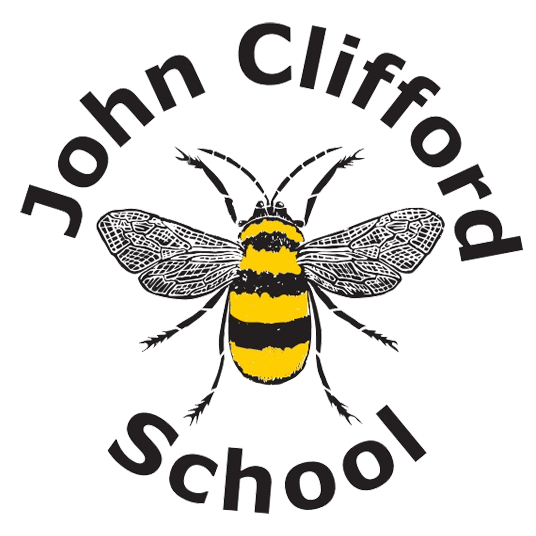Why do we teach Writing at John Clifford School?
At John Clifford School, we believe that the ability to write with confidence and accuracy is an essential life skill. Writing is a complex process that draws upon more than handwriting and spelling. It is the ability to effectively communicate ideas, information and opinions through the printed word in a wide range of contexts. Successful writers understand the social function and characteristics of writing in order to use different genres appropriately. They shape their writing to suit audience and purpose. Writing also requires the writer to understand and accurately apply the conventions of syntax, spelling and punctuation. We aim to equip children with the skills necessary to achieve this, throughout the curriculum.
Our aims are for all children at John Clifford to:
- Write with confidence, clarity and imagination;
- Understand and apply their knowledge of phonics and spelling;
- Understand how to write in a range of genres (including fiction, non-fiction and poetry), using the appropriate style, structure and features;
- Plan, draft, revise and edit their own work, and learn how to self and peer-assess against the success criteria;
- Develop a technical vocabulary through which to understand and discuss their writing;
- Develop their imagination, creativity, expressive language and critical awareness through their writing.
We aim to develop, through our teaching of writing, the following attitudes:
- Curiosity and interest;
- Pleasure and thoughtfulness;
- Critical appraisal;
- Independence;
- Confidence;
- Perseverance;
- Imagination.
How do we teach Writing at John Clifford School?
At John Clifford School, writing is taught and celebrated in a range of ways; it is taught across the school and across a range of subjects. We aim, wherever possible, to create cross-curricular writing opportunities as we believe that, in order for children to see themselves as successful writers, they need to be involved in writing for a purpose.
Fiction and non-fiction genres are taught and learnt considering the:
Links between reading and writing are made explicit – we read as writers and we write as readers. The progress throughout each unit of work shows the transition between reading as writers (focusing on structure, characterisation and language features etc…) to writing as readers (word play, description, composition, planning, editing, revising etc…).
Integral to the process of writing is speaking and listening. ‘Talk for writing’ is used as a strategy to enable children to articulate their thoughts, retell stories, orally create new stories and orally rehearse what they are going to write and then re-read what they have written. This underpins and runs alongside the writing process.
Writing is explicitly taught in a range of ways:
Modelled Writing
The teacher speaks out loud their thought processes as a writer. They model strategies in front of the children, communicating the strategies being used. Teachers may model writing skills such as punctuation, rehearsal, proof reading, editing, word selection, sentence construction and paragraphing.
Shared Writing
This is a collaborative approach in which the pupils contribute their ideas and thoughts for the teacher to write. The teacher models and teaches specific writing skills and there is the opportunity for discussion to choose the most effective or suitable ideas.
Supported Composition
The children work in pairs to provide the next sentence of the text. This may follow from the modelled or the shared writing process.
Guided Writing
Pupils are grouped according to gaps in learning, which may sometimes be (but will not always be) by writing ability. The teacher or other adult works with the group on a carefully selected task appropriate to that group’s needs and targets. This will focus on a particular aspect of the writing process rather than writing a complete piece.
Independent Writing
Children are given opportunities to apply their understanding of the text type in their own writing. They are encouraged to plan, draft, write, edit and assess their work, applying the skills they have learnt throughout the unit of work on that particular genre.
The teaching and learning of writing varies across the age range in school. In the early years, emergent writing is encouraged both inside and outside the classroom, through the use of different writing materials, including felt tipped pens, crayons, chalk, sand, magnetic letters, big brushes, water, paint and computers. Writing opportunities are available in all areas of the environment such as the role-play, construction, mud kitchen and challenge areas. Different contexts for writing are made available to the children through the use of postcards, menus, invitations, labels etc. Each week, the children are encouraged to complete a piece of writing whilst working with an adult. Children are given immediate verbal feedback and praised for what they have achieved. Alongside this, children take part in regular activities to encourage and develop gross and fine motor skills necessary to write in a legible script.
Daily phonics lessons build their phonic and spelling knowledge to enable them to sound out words and spell high frequency words correctly. Children throughout the year groups have spellings to learn relevant to their age, and these focus on high frequency words or a particular spelling pattern.
As children progress through the school, they are given many opportunities to write independently and to apply the skills they have learnt and practised in shared and guided writing. Wherever possible, writing is made meaningful by being planned for a specific purpose or in response to a particular experience.
Vocabulary, grammar and punctuation is planned and taught as an integral part of each unit of work. The objectives are carefully matched to the unit of work to enable them to be taught and learnt within a meaningful context.
Talk for Writing
As a school, we value the importance of talk and language as the foundation for good writing. Therefore, all of the previous mentioned strategies that we use in writing are underpinned by the highly acclaimed work of Pie Corbett and Talk for Writing. Through the Talk for Writing process, we guide our children through the following stages: Imitation, Innovation, Invent and Independent Application. This approach is used throughout the school from EYFS to Y6. As professionals, we take pride in understanding the needs of our children best and will make adjustments and scaffolds accordingly.
Imitation: During this stage, the children will become really familiar with the text. Listening to the text (non-fiction or fiction), retelling through use of text maps, use of drama techniques and games. We will introduce the children to the type of text this is and recap the structure of the story and how we may already know texts that follow the same conventions e.g. rags to riches stories like Cinderella. The teacher will box up the events of the text and show what this looks like. The children will be exposes to the idea of 'reading as reader' and 'reading as a writer'. Once understanding has been gained we will compile a list of successful techniques that the writer has used that we want to try.
Innovation: As we move out of the imitation stage the teacher will give the children an ooportunity to practise the techniques that the author of the original text had used. Teachers then work with the class to create a new version of the original text.
Invent/Independent Application: Teachers will suppor the children with planning and creating their own independent orignal story.
What are the outcomes for our children?
The quality of teaching and learning of writing is monitored by the writing subject leader in a variety of different ways, including: learning walks, Book Looks and planning scrutinies, all of which help to identify staff CPD needs. Where subject knowledge or pedagogical needs are identified, whole-school, phase specific or individual training is delivered.
Spelling has been a key focus of the School Improvement Plan for the past two years and there has been a definite improvement in spelling key words for most children. Handwriting has also generally improved for most children thanks to handwriting being explicitly taught throughout the school.
Children are given plenty of opportunities to undertake extended writing and, increasingly, more writing is being undertaken in the foundation subjects.
Grammar, punctuation and grammar outcomes for children against national and local data has generally improved over the last few years. However, there was been a large dip in results last year due to a high number of EAL pupils in the year group and historic high levels of mobility in the cohort, meaning that approximately 25% of the year group joined John Clifford in Year 5 or later.
![]() The National Curriculum for English
The National Curriculum for English



